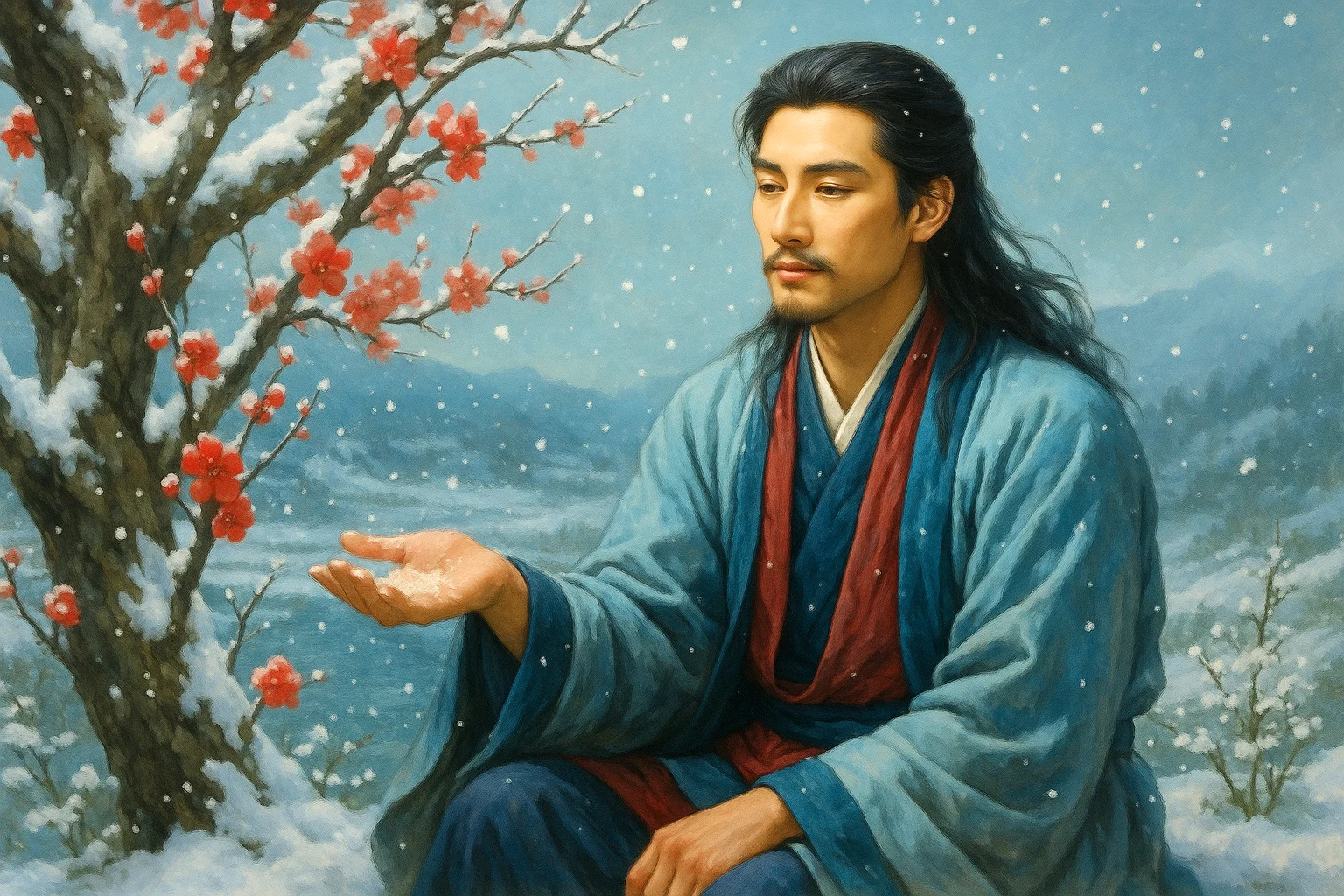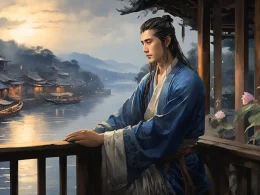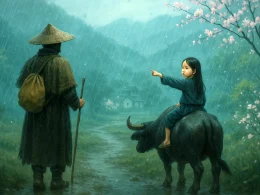Lotus blooms shed their fragrant powder,
Sparse plane trees cast their verdant shade,
In the courtyard, the hidden rain just ceases.
For no reason, I hug my shadow in this heartbreak place—
Still, I see fireflies flicker by the bamboo fence,
And hear crickets keen on mossy steps.
I accompany my guest once more on the westward path,
And ask, who now plucks the lute strings on the water’s face?
Most pitiful—this stretch of rivers and hills,
All given over to the weeping cuckoos’ cries.
I’ve long regretted our meetings were too brief;
Now, why must we part again in the west wind’s breath?
The islet chills, the mist grows faint,
The oars move, the man drifts far—
His distant boat, a leaf afloat in mist.
I imagine his lady, waiting long,
Leans on bamboo, sorrow threading her silken steps.
When he returns, they’ll drink together from jade cups,
Lower the beaded curtain,
And gaze idly at the bright, exquisite moon.
Original Poem
「八归 · 湘中送胡德华」
芳莲坠粉,疏桐吹绿,庭院暗雨乍歇。
无端抱影销魂处,还见篠墙萤暗,藓阶蛩切。
送客重寻西去路,问水面琵琶谁拨?
最可惜、一片江山,总付与啼鴂。长恨相从未款,而今何事,又对西风离别?
姜夔
渚寒烟淡,棹移人远,飘渺行舟如叶。
想文君望久,倚竹愁生步罗袜。
归来后,翠尊双饮,下了珠帘,玲珑闲看月。
Interpretation
Composed during the Chunxi era (circa 1186 or earlier) while Jiang Kui was traveling in Changsha, this ci poem bids farewell to Hu Dehua—an intimate friend now lost to history. Set along the Xiang River banks and written to Jiang's self-composed "Eightfold Return" melody, the work blends parting sorrow, homesickness, existential reflection, and national grief through layered imagery and virtuosic tonal patterns, representing the pinnacle of Song dynasty lyrical art.
First Movement: "芳莲坠粉,疏桐吹绿,庭院暗雨乍歇。无端抱影销魂处,还见篠墙萤暗,藓阶蛩切。"
Fāng lián zhuì fěn, shū tóng chuī lǜ, tíng yuàn àn yǔ zhà xiē. Wú duān bào yǐng xiāo hún chù, hái jiàn xiǎo qiáng yíng àn, xiǎn jiē qióng qiè.
Fragrant lotuses shed powder-light,
Sparse paulownias blow tender green,
After courtyard rains fade into night.
Why, hugging my shadow in despair,
Do I see fireflies glimmer by bamboo walls,
Crickets keen on mossy stairs?
The opening paints a post-rain nocturne. "Shed powder-light" (坠粉) and "tender green" (吹绿) create a fading summer palette, while "fireflies glimmer" (萤暗) and "crickets keen" (蛩切) weave sound into visual melancholy. "Hugging my shadow" (抱影销魂) crystallizes the poet's solitary anguish.
"送客重寻西去路,问水面琵琶谁拨?最可惜、一片江山,总付与啼鴂。"
Sòng kè chóng xún xī qù lù, wèn shuǐ miàn pí pá shuí bō? Zuì kě xī, yī piàn jiāng shān, zǒng fù yǔ tí jué.
Again I walk the westward parting track,
Asking the river: 'Who plucks pipa strings?'
Ah, most pitiful—this splendid land
Left to the cuckoo's hopeless weepings.
Transitioning to riverside farewell, the rhetorical question invokes Bai Juyi's "Pipa Song" of exile. The "cuckoo's weepings" (啼鴂), symbolic of unfulfilled longing, lament both personal and national sorrows—the Southern Song's truncated territory mirroring the poet's fractured journeys.
Second Movement: "长恨相从未款,而今何事,又对西风离别?"
Cháng hèn xiāng cóng wèi kuǎn, ér jīn hé shì, yòu duì xī fēng lí bié?
I've long regretted our meetings' brevity—
Why must autumn winds now sever
Our bond again?
The plaintive question "why?" (何事) pierces through the poem, with "autumn winds" (西风) embodying time's cruel transitions. The tone shifts from description to raw lament.
"渚寒烟淡,棹移人远,飘渺行舟如叶。"
Zhǔ hán yān dàn, zhào yí rén yuǎn, piāo miǎo xíng zhōu rú yè.
Islets chill in faint mist,
Oars carry you beyond my gaze—
Your boat a leaf in haze.
The farewell scene achieves sublime minimalism. "A leaf in haze" (如叶) reduces human presence to nature's fragility, echoing the transience central to Chinese parting poetry.
"想文君望久,倚竹愁生步罗袜。"
Xiǎng Wén jūn wàng jiǔ, yǐ zhú chóu shēng bù luó wà.
I imagine your lady awaiting long,
Leaning on bamboos in silken socks,
Her sorrow measured in lingering steps.
The allusion to Zhuo Wenjun (文君), the Han dynasty poetess, personalizes absence. "Silken socks" (罗袜) epitomize Tang-Song poetry's delicate femininity, here symbolizing domestic yearning.
"归来后,翠尊双饮,下了珠帘,玲珑闲看月。"
Guī lái hòu, cuì zūn shuāng yǐn, xià le zhū lián, líng lóng xián kàn yuè.
When you return, together you'll drink
From jade cups, lower pearl blinds,
And admire the moon's crystalline grace.
The conclusion projects a future reunion. "Pearl blinds" (珠帘) and "crystalline grace" (玲珑) craft an intimate tableau, transforming sorrow into quiet hope—a characteristic Jiang Kui resolution where aesthetic refinement soothes existential pain.
Holistic Appreciation
This lyric poem is uniquely structured—the first half grounded in reality, the second half drifting into the imagined; the beginning dwelling on the poet's own parting sorrow, the latter envisioning his friend's joyous homecoming. By transcending personal grief and projecting emotions onto another, the poem reveals extraordinary emotional breadth. Its composition flows like drifting silk threads, creating an ethereal and profound atmosphere. With masterful scene transitions and subtle allusions, Jiang Kui weaves together multiple themes—farewell, melancholy, the passing of spring, homesickness, and the anguish of a displaced era—into a single lyrical tapestry. The poem moves from the chill of late autumn to the quiet beauty of nightfall, balancing deep emotion with restrained elegance, sorrow without despair.
Artistic Merits
- A Coldly Elegant, Ethereal Mood: Through imagery like courtyard rain, fireflies flickering on bamboo fences, riverside farewells, and solitary boats on sandbars, Jiang Kui constructs a scene both desolate and refined, embodying his signature "clear emptiness" (清空) aesthetic.
- Seamless Classical Allusions: References to Song of the Pipa Player, "Wenjun," "leaning on bamboo," and "silk stockings" are woven in effortlessly, transforming old motifs into fresh emotional expressions.
- Clear Structural Layers: The poem shifts from courtyard to riverside, from parting to imagined reunion, navigating time and space with flawless transitions—a testament to Jiang Kui's compositional mastery.
- Sorrow Without Anguish, Deep Yet Restrained: The emotion is delicate and understated, neither excessive nor harsh. While permeated with melancholy, it avoids despair, maintaining the poet's characteristic grace throughout.
Insights
This is more than a farewell poem—it is a convergence of layered emotions. It teaches us that the pain of parting lies not in explicit words but in scenes imbued with feeling and meaning conveyed beyond language. With a sensitive heart attuned to human experience and the shifting world, Jiang Kui crafts profound emotional landscapes through minimalist expression. In a chaotic reality, truly moving art often springs from deep personal and historical awareness, articulated with subtle brilliance. Here, the poet's private sorrow mirrors the collective unease and lament of his era—a testament to the enduring depth of his lyricism.
About the poet

Jiang Kui (姜夔, c. 1155 - 1221), a native of Poyang, Jiangxi, was a Southern Song Dynasty lyric poet and musician. He remained a commoner throughout his life. His lyrics are known for their ethereal and austere style, and his poetry is also highly regarded. Along with Fan Chengda and Yang Wanli, he is celebrated as one of the "Four Great Masters of the Restoration."












